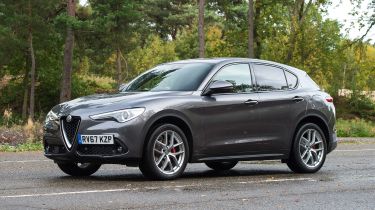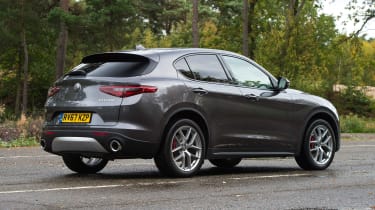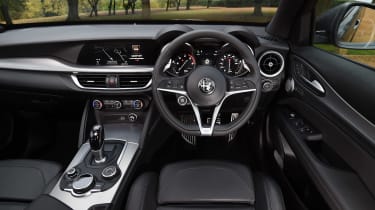Used Alfa Romeo Stelvio (Mk1, 2017-date) review
A full used buyer’s guide on the Alfa Romeo Stelvio covering the Stelvio Mk1 (2017-date)
Verdict
It might have taken Alfa Romeo a long time to join the SUV party, but when it did arrive, the Stelvio offered something different from the norm. That was a car which looked stylish inside and out and was good to drive. The performance of Alfa’s dealer network is unknown because it hasn’t appeared in recent Driver Power Dealer surveys, but there’s no doubt that the Stelvio can match premium rivals in many ways, especially when it comes to dynamic ability, design, comfort and also reliability. There’s still a little way to go when it comes to practicality and build quality, but it’s clear that the Stelvio has plenty to offer.
SUVs first became popular with the masses in the 1990s, but it wasn’t until the early 2000s that more overly sporting brands such as Porsche took an interest.
Not all car makers were convinced, though, and several prestige or semi-premium brands decided to sit it out, rather than risk the wrath of die-hard enthusiasts. Alfa Romeo was one of them, and it’s easy to see why: its USP for a long time has been a focus on driving pleasure above all else, and launching an SUV isn’t the best way of expressing that. But it became clear that buyers wanted an SUV so the firm relented.
Used - available now

2019 Alfa Romeo
Stelvio
62,511 milesAutomaticDiesel2.1L
Cash £15,800
2021 Alfa Romeo
Stelvio
17,343 milesAutomaticDiesel2.1L
Cash £30,049
2021 Alfa Romeo
Stelvio
22,219 milesAutomaticPetrol2.0L
Cash £29,549
2019 Alfa Romeo
Stelvio
19,628 milesAutomaticPetrol2.0L
Cash £22,399Admittedly the Stelvio hasn’t been a runaway success, but that’s arguably more to do with perceptions than shortcomings.
Model covered
- Alfa Romeo Stelvio (2017-date) - Need a prestige SUV but don’t want to blend in? The Stelvio is the car for you.
History
The Stelvio arrived in September 2017. At launch there was a choice of a 207bhp 2.2-litre diesel engine and a 276bhp 2.0-litre turbocharged petrol unit, both with an eight-speed automatic transmission. Within weeks Alfa Romeo added a 177bhp 2.2 diesel and 197bhp 2.0-litre turbocharged petrol engine to the range.
The Stelvio Quadrifoglio arrived in March 2018, with a 503bhp twin-turbo 2.9-litre V6 petrol engine; six months later the 2.2d engine got a 10bhp boost (to 187bhp) and all cars got Apple CarPlay and Android Auto.
In September 2019, Ti models joined the line-up. From January 2020 the interior quality was upgraded and the trim structure was revised (now Super, Sprint, Lusso Ti, Veloce and Quadrifoglio), then in December 2020 a range-topping Veloce Ti trim was added to keep the Stelvio competitive.
Which one should I buy?
No Stelvio feels underpowered, and without a manual gearbox option it’s just a question of pinning down how much power you want, and whether you prefer petrol or diesel. We wouldn’t steer you away from any of the engines, but by far the most popular is the 276bhp petrol unit.
All trims come with plenty of equipment, with the entry-level Stelvio sporting 17-inch alloy wheels, an 8.8-inch display, automatic headlights and wipers, cruise control, dual-zone climate control, DAB radio and rear parking sensors. The Super adds part-leather trim, front parking sensors, navigation and 18-inch wheels, while the Speciale came with 19-inch alloys, bi-xenon headlights and leather trim, with electric adjustment and heating for the front seats. This was the standard equipment in spring 2018; after that, Alfa Romeo regularly tweaked specs, as well as trim levels.
Alternatives to the Alfa Romeo Stelvio
The Audi Q5, BMW X3 and Mercedes GLC all offer formidable competition, with impressive interiors, generally very efficient engines, strong images and plenty of the latest safety and comfort tech. If driving pleasure is a high priority you need to look to the Porsche Macan. Purchase and running costs are a bit higher, but the Macan is dynamically superb, roomy, and it’s built to a beautiful standard.
The Jaguar F-Type still looks distinctive and stylish, plus it’s good to drive – much like the Volvo XC60, which features very impressive safety credentials. Equipment levels are also impressive, although purchase prices are quite high. The Land Rover Discovery Sport looks smart and offers seven-seat flexibility, but it can’t match the Alfa Romeo dynamically.
What to look for
Back-up
Cars registered from 1 July 2018 had the ‘5-3-5’ warranty/servicing/breakdown pack. Earlier cars had three years’ warranty.
Drive
Most Stelvios send power to all four wheels, but the entry-level diesel came with a choice of rear-wheel drive or all-wheel drive.
Puncture
All Stelvios come with a tyre mobility kit rather than a spare wheel. Alfa Romeo dealers will sell you a compact space saver for around £300.
Towing
The 2.0T 200 can tow just 1,600kg (later increased to 2,000kg) but the 2.2d 180 RWD only manages 1,700kg. All other models can tow a 2,300kg load.
Common faults
In our 2020 Driver Power brands survey (which featured a total of 30 manufacturers), 28.6 per cent of Alfa Romeo owners reported one or more faults within the first year of ownership, so check used examples well.
Interior
Alfa Romeo does some of the most beautifully designed interiors in the business, and it’s no different here. The quality is also impressive, although the Stelvio’s various infotainment systems have never been class-leading.
It also can’t offer the cabin space of some rivals, but there’s room for four adults. Similarly, boot space isn’t all that generous at 525 litres, which expands to 1,600 litres with the seats folded.
An 8.8-inch touchscreen infotainment system is standard for the Stelvio, with DAB radio, Apple CarPlay/Android Auto and Bluetooth connectivity all standard, as well as sat-nav on later models.
Prices
Visit our Find a Car service for the latest used deals on a Alfa Romeo Stelvio, or used out Free Car Valuation tool for a price on a specific car.
Running costs
All Stelvios need to be serviced every 12 months, and in the case of the petrol-engined models there’s a 9,000-mile limit between garage visits. The diesel models stretch this to 12,000 miles.
Services alternate between minor and major, which are priced at around £250 and £450 respectively, but you can buy service plans for one year (£239), two years (£399), three years (£499) or four years (£649). The brake fluid needs to be renewed every other year, and the cost of this is included in each relevant service.
The petrol engines aren’t fitted with a cambelt, but the diesel engines are, and this needs to be replaced every five years or 74,500 miles.
Recalls
Alfa Romeo has recalled the Stelvio on five occasions so far, the first occasion being in March 2018. The cause of this campaign was that the brake and clutch systems of some early Stelvios had been filled with incorrect fluid on the production line. The next recall came a couple of months later, this time because water could get into the electrics, leading to the tailgate opening of its own accord, while the car was being driven.
Recall number three was issued in July 2019, because of faulty adaptive cruise control software, then two months later came campaign number four. This was because of another software glitch, which could lead to the fuel gauge claiming that there was more fuel in the tank than there really was. The most recent recall, for faulty seat latching mechanisms, came in January 2020.
Driver Power owner satisfaction
The Stelvio doesn’t sell in big enough numbers to make an appearance in any of our Driver Power surveys, but the Giulia (which shares much with the Stelvio) appeared in our 2019 new car survey – in a very impressive third place out of 75 cars. Alfa Romeo is included in our brands survey each year though, and in 2020 it came an impressive ninth, having come an even more impressive second in 2019.










